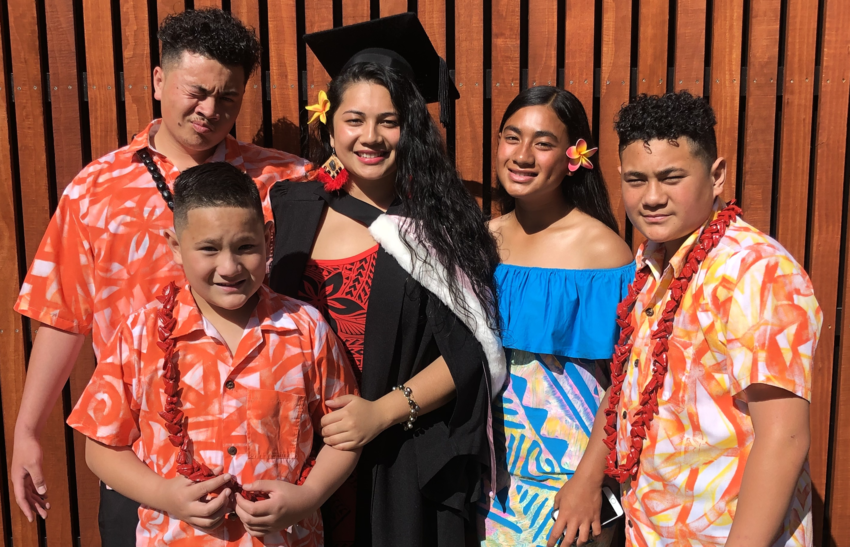Big sisters speak: strong, reliable, but don’t expect them to be perfect

by Mariner Fagaiava-Muller
“It’s funny because a child, babysitting a child? That’s the norm for us,” she said. “It’s an unspoken responsibility.”
“For us brown women, we’re told what we have to be, who we have to be, where we can go, what we can do. That has an impact on the boundaries we hold moving forward.”
“It’s sacred in how you tautua to your aiga and nu’u around you.”
The world has sung along to Encanto and the life of Luisa Madrigal, and followed the trials of the eldest siblings on Bridgerton - but being the eldest child in a Pacific family comes with its own particular realities and responsibilities. Three Pacific big sisters share their stories.
At almost 22-years-old, Paulina Tapua’i-Soti feels like it’s only now she can begin living out her aspirations - after a teenagehood spent tending to two little brothers.
She’s the second child of her parents, their eldest and only girl. Until the birth of her younger siblings, Paulina enjoyed a spoiled upbringing by extended family.
“When my youngest brother was born, I settled into a different role as a third parent,” she says.
“I was nine at the time, and remember coming home from school. My mum left a note on the dinner table to say she had flown out of town for the week, my dad was overseas, so it was just my three brothers, grandma and I.”

Paulina’s before and after school commute extended to the boys’ extra-curricular activities, at the expense of little free time she had outside class.
“At any point that my brothers might’ve made a wrong decision or made a mistake, it was my fault or my responsibility for doing better,” she says.
“It’s through no fault of my parents, but I definitely felt like I lost my adolescent years to raising my younger brothers. As much as I think I enjoyed that time, I didn’t.”
“As someone who looks after them, you don’t really reap the rewards until they’re older and you see them blossoming."
Who out of a brother and sister is held more to the consequences of their actions is the topic of frequent debate.
Paulina says, “our family and friends always make jokes that although I’m not the eldest, I actually am because of the responsibility I hold as opposed to my older brother.”
“For us brown women, we’re told what we have to be, who we have to be, where we can go, what we can do. That has an impact on the boundaries we hold moving forward.”

Fereni Peti agrees. Every Pacific woman can relate with a pressure to maintain perfection, says the 24-year-old tama’ita’i Sāmoa.
“In the Sāmoan culture, there’s this idea that the boys are the princesses in the family and the girls are actually the boys.”
“I feel like we have to work 10 times harder, I see that in other young women who are the eldest in their family.”
While she was in high school, Fereni’s older brother moved out. She naturally assumed the eldest sibling role and so too, becoming her younger siblings’ “second mum”.
“In the early days, I’d say it took a mental toll because my dad left for a while. So having to carry my mum for a period of time was rough, then my dad came back into the picture. The impacts were tough.”
“There was this expectation that I had to make sure I was bringing in money, but also keeping up with chores at home, doing stuff for my younger siblings’ and taking them places when nobody else could.”
On the cusp of graduating with a geography degree, Fereni says she reached such feats from grit possessed at a young age.
“You could see it as hindering my growth but in another sense, it actually kind of accelerated it.”
“I was made to think differently from what I was used to and although I was made to grow up fast, I had a grip on my life at an early age.”
“I’m grateful for the experiences I hold as the eldest daughter of a Pacific family,” she says.
“Honestly I wouldn’t take it back because it made me who I am today, and I’m definitely stronger as a result.”
Going the extra mile was something Sulani Helg learnt from birth. She remembers a lot of babysitting as the oldest grandchild in her maternal family.
“It’s funny because a child, babysitting a child? That’s the norm for us,” she said. “It’s an unspoken responsibility.”
She eventually became a big sister to four.
“I was doing everything to make everyone around me happy,” she says.
“Looking back, that was me living in survival mode. I learnt that from my parents, to serve and be guided by a moral compass.”
Once finishing up as the head girl of her Auckland high school, Sulani relocated to Wellington for university. It all hit her at once, she says.
“I remember graduating with my undergrad, moving back home and hitting rock bottom. I thought, ‘damn what have I been doing?’”
“But of course I realised the responsibility of being the eldest,” she concedes.
“It’s sacred in how you tautua to your aiga and nu’u around you.”

Sulani has learnt to take the good with the bad. She will instil these learnings when one day, raising her own daughter.
She says, “I’m incredibly blessed with the best village.”
“Blessed with cousins, aunties and uncles who always love hard on my family.
“Siblings who share the load and keep me humble. And my parents, who are out here breaking intergenerational curses.”
-
Public Interest Journalism funded by NZ On Air
